Local Wins Lead to Bigger Policy Victories
- 2020-08-07
- By Heather Meyer
- Posted in Community-Driven Change
In a video by the anti-corruption advocacy group, Represent Us, Jennifer Lawrence highlights the findings of a 2015 Bloomberg analysis that demonstrates the importance of local politics when sizing up national change.
Similarly, family leaders in Colorado have experienced larger, statewide wins in policy change after realizing local efforts toward those ends.
It Takes Time to Reach the Tipping Point
For family leaders with their eyes on the prize of widespread, systemic change, it is important to realize that consecutive “small wins” take time, at least in the beginning. And starting local can make all the difference in the world.
Take the recent Federal legislation (December, 2019) that raised the “minimum sale age” for tobacco products from 18 to 21, and work backward in time to see how a young leader in Eagle County helped tip this policy change.
In 2018, then 16-year-old Lilly Reynolds attended FLTI of Eagle County, completing a civic project that focused on educating local students about adolescent substance use. That summer, she secured an internship with the Eagle County Public Health Department and began to learn of a national initiative called Tobacco 21.

In 2017, the towns of Aspen and Basalt became the first Colorado jurisdictions to pass Tobacco 21 laws. In the summer of 2018, during Lilly’s internship with Eagle County, a Colorado Public Radio article reported over 320 cities nationwide had adopted Tobacco 21 laws, though only 5 states had statewide policies in effect.
In the fall of 2018 and subsequent spring, Lilly and another Eagle County family leader, Gerry Lopez, worked with Colorado Representatives Kerry Tipper (D – HD 28) and Chris Kennedy (D – HD 23) as well as Colorado Senators Rhonda Fields (D – SD 29) and Kevin Priola (R – SD 25) to pass HB 19-1033, which allowed local jurisdictions to pass ordinances that are more stringent than state regulations concerning the sales of tobacco and/or nicotine products. Lilly and her public health colleagues then set work in motion that resulted in Tobacco 21 laws being passed in local jurisdictions throughout Colorado.
By November, 2019 nineteen (19) states and over 540 local governments had passed Tobacco 21 laws, including the Town of Avon and Eagle County, effectively tipping the minimum age of sale for tobacco across the nation with the President amended the federal minimum age of sale for tobacco products in the Federal Food Drug and Cosmetic Act.
Tipping Deeply Rooted Systems
Following the acquittal of Trayvon Martin’s killer in 2013, the #blacklivesmatter (BLM) hashtag birthed a movement dedicated to ending systemic racism in the U.S. Racial tensions continued to mount in 2014 as inequities such as water crisis in Flint, Michigan and the fatal shooting of Michael Brown by police in Ferguson, MO caught attention of national media. Capitalizing on the increasing number of race-based incidents of aggression and violence captured on video, BLM has successfully continued to draw attention to systemic racism with effective grassroots organizing and the sharing power of social media.
“A few pioneer states get out in front before the others, then a key event – often a court decision or a grassroots campaign reaching maturity – triggers a rush of state activity that ultimately leads to a change in federal law.”
– Bloomberg Policy Analysis, 2015.
In March of 2019, an officer with the Boulder Police Department garnered national attention in a viral bystander’s video that showed him pulling a gun on Zayd Atkinson, a student at Boulder’s Naropa University, for nothing other than ‘doing yardwork while Black.’

Longtime community advocate and 2018 graduate of the Boulder County – Lafayette FLTI class, Nami Thompson, organized and spoke at a local rally that resulted in the city of Boulder officials committing to create a police oversight task force that included key stakeholders, community members, and local officials. Thompson’s bold leadership included making two requests that were ultimately included in the city of Boulder’s charter for the task force:
- Preference be given to applicants who were not currently or previously serving on other city boards or commissions;
- Financial stipends be made available for applicants who might otherwise face barriers to participation.
Led by the skilled facilitation and racial justice expertise of FLTI of Colorado Trainer, Dr. Carolyn Love, the city of Boulder’s Police Oversight Task Force began holding bi-weekly meetings that ran from May 30 to October 24, 2019. The task force made a recommendation for Boulder City Council to create a position for an independent police auditor/monitor, as well as a new group of community members to oversee the search for the new staff. The recommendation was unanimously approved by the Boulder City Council.
Over 1,500 collective hours, and new hires for Boulder Police Chief and Independent Monitor later, the community-driven efforts initiated by Thompson continue to tip towards systemic change for greater police accountability. Mere weeks ago, in the flurry to finish the 2020 Colorado Legislative Session (due to the COVID-19 pandemic), state officials followed Boulder’s example by passing “one of the most comprehensive police reform packages in the country.”
Thompson recently shared her optimism for the future, noting that these wins are early in the longer battle of dismantling systemic racism. “We are still in it as far as ugly police behavior goes… Believe it or not, there’s still work to be done in as much as civilians will form the oversight body itself, determine the rules, get clear on who has which function, and everybody will have to be educated in a new way of doing things.”


